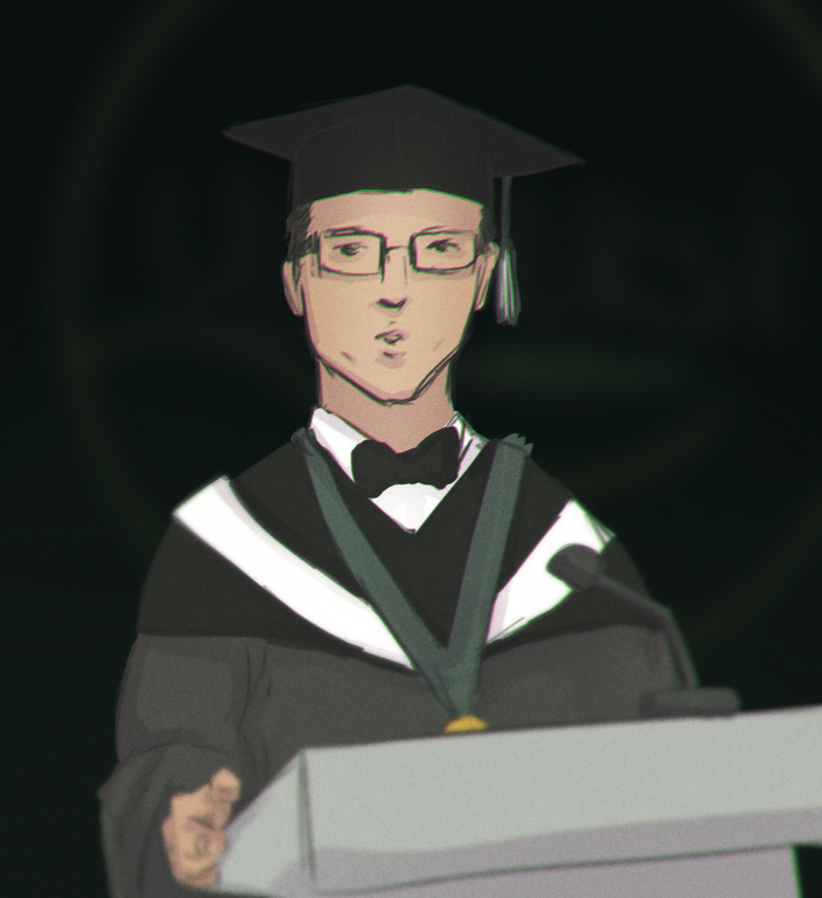By Michael Scoular (The Cascade) – Email

“Although I oppose the idea of the Commencement address, I have been thinking about what would have been useful for me to hear on the day I left college. I wish that someone had said to me that it’s normal to feel lost.”
— Ira Glass
“Whenever we speak, we tend to make matters sound simpler than they are, and than we know they are.”
— Susan Sontag
“Advice is a form of nostalgia. Dispensing it is a way of fishing the past from the disposal, wiping it off, painting over the ugly parts and recycling it for more than it’s worth.”
— Mary Schmich
“All go their separate identical ways led by the longing in the obsessed, obscene heart.”
— “The Commencement Day Address,” Delmore Schwartz
I could go on, quoting from commencement day addresses, calling it a commemorative non-editorial for the class of 2016, and call it a day. There is no longer the exclusive feeling surrounding the ceremony: the pageant is still something different to experience in person, both ridiculous and reverent, but you can call up, for example, a list of over a hundred “best” commencement speeches compiled by National Public Radio in the States. This is a list with Arianna Huffington on it twice and Ed Helms three times, but it’s lengthy enough that you’ll also see the hits: J.K. Rowling, David Foster Wallace, the first two quoted above, presidents, cultural idols, the kind of speakers who, upon seeing them, will be a special private experience you’ll be able to take with you: “At my graduation, X spoke. They were actually pretty real.”
But that isn’t UFV: the world is full of inspirational speeches, loosed by the publication of overpriced 40-page hardbacks and the internet, but anyone attending their graduation will likely feel pulled between two worlds: the personal, internal one, calculating and writing the narrative that brought them to this moment, and the one actually seeing what is before them. Like any ritual, there is the pull to tread lightly here: commencement is about as religious as UFV gets, and God knows there’s an immense amount of work that goes into securing speakers and choosing everything, from the chairs to the lights to the sound. So there are the unwritten rules: Don’t be disrespectful, do realize you’re a part of something bigger than just you, but also take pride in yourself.
I’ve attended one commencement ceremony (last year’s), and most of its memory is washed away by the actual moments that matter to students: the five seconds spent crossing the stage, and the hours spent after exiting the doors outside, where, outside of the sanctuary, arena, whatever you want to call it, you’re finally free to talk.
As I’ve watched the people I’ve known graduate UFV, many of them before me, it’s with an awareness of: this could happen to you. You could get a job and leave for another city; you could stick around in the Fraser Valley, minutes away from campus; you could decide, in the way speeches seem to describe, to abandon a set plan and choose to live in a way that defies the narrative of your colleagues and parents and friends; you could meet up, every now and then, on Facebook walls and at parties, and talk about how great university was, and how cool you were, and what you miss. So to say this is good and this is pretty boring about commencement is really beside the point: who was there and what was said won’t matter much in the end. The ceremony exists to flatten out experience: the tears and agony and defeat, and the jubilation, the sense of an ending, the relief all meet together and look the same and know the same core, uh, institutional outcomes.
But for those about to sit through your last moments as a student, a few things to note: UFV’s identity is vaguely positive, and cards declaring what you need to do to activate your alumni membership will be pressed into your hand, and it will all be very didactic. “Take this wisdom, this identity with you, not because I say so, but because it’s probably true,” the speeches mostly say. UFV has assembled four honorary speakers: Halldor Bjarnason, Linda Frimer, Luigi Aquilini, and George Peary, one for each ceremony. Maybe they will break through and say something memorable. It’s almost inevitably the same, though: as Sontag calls it, it’s a secular sermon, a genre of alarm, then exhortation. It’s awful out there, but you’re here, so you must know how to struggle well. Don’t worry, they’ll also make you laugh a little. Feel inspired and misty a little.
In my opinion, UFV could do more to acknowledge its unique place as an educational institution: it doesn’t always get the star students, the affluent citizens of the world that will find ways to make others more affluent, it really isn’t the first choice of many of those that walk through its halls. Yet they find a way to love something about it anyway, and get through their four or five or six years. An institution that, even if not entirely, is a place that gives access to students who otherwise could not afford a university education, is a place where many students are the first in their family to graduate, is a great one. Instead, many of the pats on the back will likely end up sounding as specific and genuine as The Onion’s parody of Hillary Clinton empathizing with young Americans. You guys all like coffee and all-nighters, right?
Anyway, if there’s anything I’ve learned from reading up on commencement before writing this, it’s that the speeches are really only opening acts: no matter how many carpe diems and unlikely stories of survival, the key is brevity and wit and getting out of the way of the future. So, I’ll go.


